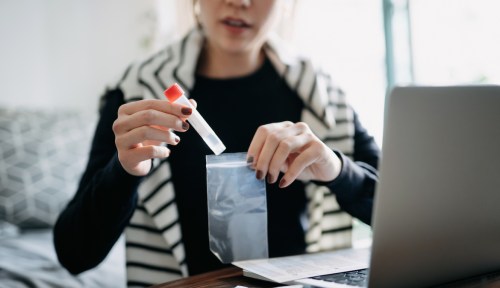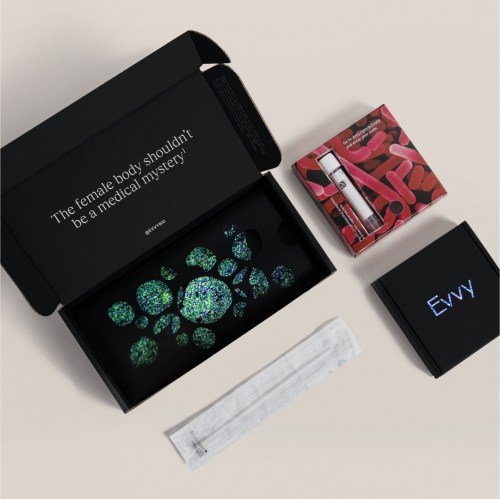Our editors independently select these products. Making a purchase through our links may earn Well+Good a commission
The Evvy Vaginal Microbiome Test Helps You Understand Your Bacteria *Down There*—So I Tried It
Femtech startup Evvy is hoping to help finally close the gender health gap—one vaginal swab at a time—with its new test kits.

If recent buzz around the lack of understanding of the clitoris is any example of how surprisingly little the scientific and medical communities prioritize learning about the female body—then we know there’s still much more room for progress. Both have historically left women behind for many reasons. Case in point, the gender research gap that still exists and continues to harm women—just one example being how we treat and understand vaginal health issues.
“Women weren’t required to be in clinical research until 1993,” says Priyanka Jain, who co-founded Evvy, a femtech startup, in 2021with Laine Bruzek. “And that lack of information leads us to the state of today that women are on average diagnosed four years later than men across over 700 diseases.”
8 Stylish and Adjustable Office Chairs a Chiropractor Would Approve Of

ThirdLove Just Launched Bras That Help Balance Your Body Temperature—Here’s Why That’s a Game-Changer for Women in All Life Stages

These Are the Summer Essentials You Should Bring With You Every Time You Leave the House, According to a Derm and an RD

It’s because of shortcomings such as these that Bruzek and Jain decided to start Evvy, which offers a vaginal microbiome test that uses special metagenomic sequencing (using DNA samples) to detect specific types of bacteria in the vagina.

Evvy Vaginal Microbiome Test — $129.00
So why a vaginal microbiome test specifically? According to Jain, there are many biomarkers that only exist in female bodies that tend to get overlooked by the medical and scientific communities. So Jain and Bruzek considered which ones weren’t being looked at—but had plenty of potential to improve healthcare outcomes for women. “As we were exploring where to start, we honestly couldn’t escape the vaginal microbiome,” Jain says.
Even though scientists have know of the importance of the vaginal microbiome for 20 years or so, much of the research was focused on how the biome relates to childbirth, according to gynecologist Suzanne Fenske, MD who is the founder of TaraMD, an innovative gynecology practice in New York City. But the implications of vaginal microbiome extend far beyond childbirth. A compromised or abnormal vaginal microbiome is linked to gynecologic issues including an increased risk of vaginal infections such as yeast infections and bacterial vaginosis (BV), sexually transmitted infections (STIs), and preterm labor according to Dr. Fenske.
As a health writer, I’ve always known about the gut microbiome, and I found it so interesting and helpful to learn about how my own was doing by having it tested in the past. So after learning about Evvy, I was curious to discover what I could learn about my vaginal microbiome, too. In particular, I wanted to know what could potentially change or disrupt it over time. I was also curious to learn if birth control could affect my microbiome since hormonal contraceptives have been shown to change the vaginal microbiome in some studies and I’d started a new form six months ago.
Here’s how the test works: Evvy is an-at home test kit (a single test is $129, or a membership is $99 per test shipped every three months). You send your sample (a vaginal swab) to a lab for processing. Each step along the way, Evvy sends you an email letting you know where your sample is and when you can expect your results—it takes about two weeks.
In the report, you get a detailed look at what kinds of bacteria are present in your vaginal microbiome (both good and bad) with detailed information on what that could mean for your health. You also get a customized action plan with lifestyle recommendations (like info on how using condoms can cut down your risk of yeast infections) and next steps to improve your symptoms (or prevent future issues). Each Evvy test includes a call with a health coach who can help walk you through your test results and action plan or answer any questions you have.
What trying the Evvy vaginal microbiome test is like
When I got my Evvy test kit in the mail, I found everything was labeled clearly, and it was easy to collect my sample. I did have to wait to take it, though, since I happened to have my period when the test arrived, and the instructions say you can’t test if you’re menstruating, had sex in the past 24 hours, used any kind of vaginal creams or suppositories, or if you’ve used antibiotics in the last seven days, BTW.
In the meantime, I activated my test online and filled out a detailed questionnaire that asks you to report information about your current symptoms, health history, and sexual history.
Once I activated my test, filled out the questionnaire, I collected the sample to send to the lab. The test kit comes with a swab and collection tube—it doesn’t look all that different from a Covid-19 test, TBH. To collect your sample, you insert the swab into the vagina and circle it for 20 seconds. Then you place it in the collection tube where it remains sealed. You place that into the return box and drop it in the mail, and then it’s shipped off to Evvy’s lab.
The results of my vaginal microbiome test
After about two weeks, I got my results back in an email from Evvy. Once you click into them, you’re taken back to the Evvy site where you can see a detailed overview of your results, learn about your microbiome type (more on that later), see trends and insights (this is where you can track your results over time if you continue to test regularly), and curated content and insights based on what you reported in your health evaluation— mine included content on oral contraceptives and how the use of combined oral contraceptives is linked to a reduced risk of BV and a balanced microbiome.
My results overall were what I expected given that I’m not currently experiencing a lot of symptoms—it said my microbiome contains 99 percent protective bacteria, and only one percent harmful bacteria. Evvy also reports your microbiome type, or Community State Type (CST), categories that researchers have used to group vaginal microbiome types. My microbiome type is 1-A, which research shows is the best type for preventing vaginal infections. This type is characterized by having the dominant bacteria Lactobacillus crispatus, which is a protective bacteria found in the vagina.
My health plan (which Evvy points out is not a diagnostic plan but a wellness screen that should be shared with your doctor) includes some pointers on what to do next. The first tip I get is to talk to my doc about further testing for disruptive bacteria (although I appreciate the tip, my good bacteria is so high and my symptoms are low that I don’t think it’s necessary right now).
The next tip involves maintenance, where it’s suggested that I take probiotics only as necessary (like when I’m on antibiotics for example) since taking too many probiotics could cause yeast overgrowth. While I don’t take a probiotic every day, I found this interesting since so many people do. The report says, “There is also the potential for continued probiotic use to result in lactobacilli overgrowth (cytolytic vaginosis). For this reason, the evidence would point to just letting your microbiome do it’s thing!”
This is accompanied by two research articles on the subject and Evvy calls out that this rec is based on evolving research, so it’s solid but still evolving. I also ran the test by Dr. Fenske, asking her opinion on the test method and results. Her take? “I think it could be a very useful tool for understanding the root cause of recurrent vaginal infections and, possibly, etiologies [causes] of vulvar/vaginal pain,” she says.
Overall, I walked away learning a ton about the vaginal microbiome and the potential that more research on it can have on big health issues like knowing more about problems that many women experience but lack answers to—like chronic BV, painful sex, and vulvodynia (chronic, unexplained pain around the vagina or vulva).
Personally, I’ll continue monitoring my microbiome and test again if I have symptoms or even a few times a year just to see how things are doing.
Why knowing more about the vaginal microbiome has big implications for closing the health gap for people with vaginas
Speaking of more research, Evvy is using the data from the test (which is de-identified before it’s used for research) to partner with researchers and health experts in the scientific community to fill in the gaps on vaginal health, improve research, and help the medical community understand more about the female body.
As of 2022, Evvy has created the largest data set that anyone has on the vaginal microbiome. And this dataset is a launching point the founders hope is the start of progress for closing the gender health divide. “For us to actually enable better care outcomes across the board, we first need to start with all of that better research,” Jain says. “And we’re really hoping to help pioneer that so that everyone experiencing care—through Evvy or anywhere—can access much better care from their physicians.”




